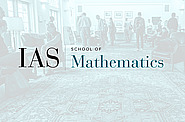Previous Special Year Seminar
Jul
30
2020
Theoretical Machine Learning Seminar
Efficient Robot Skill Learning via Grounded Simulation Learning, Imitation Learning from Observation, and Off-Policy Reinforcement Learning
Peter Stone
3:00pm|Remote Access Only - see link below
Jul
28
2020
Theoretical Machine Learning Seminar
Generalized Energy-Based Models
Arthur Gretton
12:30pm|Remote Access Only - see link below
Jul
23
2020
Theoretical Machine Learning Seminar
Priors for Semantic Variables
Yoshua Bengio
3:00pm|Remote Access Only - see link below
Jul
21
2020
Theoretical Machine Learning Seminar
Graph Nets: The Next Generation
Max Welling
12:30pm|Remote Access Only - see link below
Jul
14
2020
Theoretical Machine Learning Seminar
Relaxing the I.I.D. Assumption: Adaptive Minimax Optimal Sequential Prediction with Expert Advice
Jeffrey Negrea
12:30pm|Remote Access Only - see link below
Jul
09
2020
Theoretical Machine Learning Seminar
Role of Interaction in Competitive Optimization
Anima Anandkumar
3:00pm|Remote Access Only - see link below
Jul
07
2020
Theoretical Machine Learning Seminar
Machine learning-based design (of proteins, small molecules and beyond)
Jennifer Listgarten
12:30pm|Remote Access Only - see link below
Jun
25
2020
Theoretical Machine Learning Seminar
Instance-Hiding Schemes for Private Distributed Learning
3:00pm|Remote Access Only - see link below
Jun
23
2020
Theoretical Machine Learning Seminar
Generalizable Adversarial Robustness to Unforeseen Attacks
Soheil Feizi
12:30pm|Remote Access Only - see link below
Jun
18
2020
Theoretical Machine Learning Seminar
The challenges of model-based reinforcement learning and how to overcome them
Csaba Szepesvari
3:00pm|Remote Access Only - see link below
